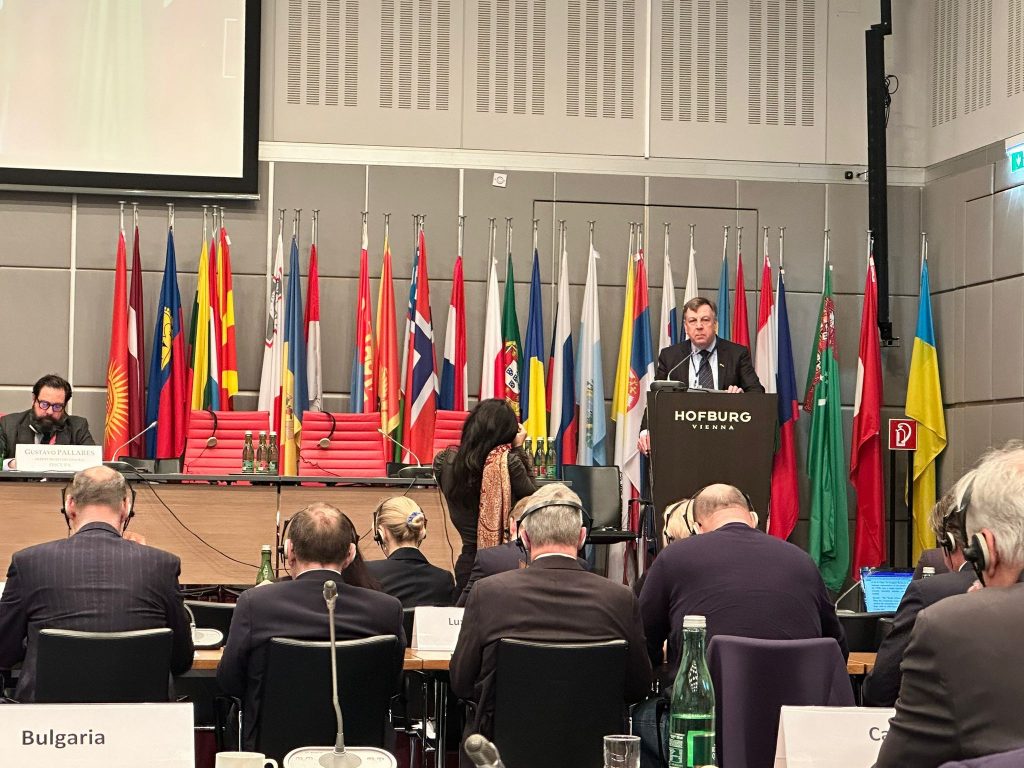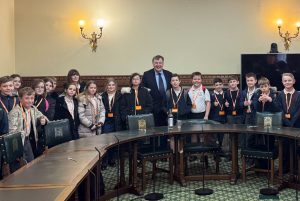Today on 22nd February 2024 in Vienna, Sir John Whittingdale OBE, MP for Maldon, attended the OSCE Parliamentary Assembly in his capacity as leader of the UK Delegation.
Sir John attended the event alongside more than 230 delegates from 54 OSCE countries, to discuss the state of European security, in the backdrop of what will soon be the two year anniversary of the Russian Federation’s full-scale invasion of Ukraine
The ongoing war has not only devastated Ukraine but has severely undermined the European security architecture. These were the sentiments expressed today on 22nd February 2024 by participants, at the opening of the OSCE Parliamentary Assembly’s 23rd Winter Meeting in Vienna. It was further emphasised that efforts to hold Moscow accountable and reinforce the principles of the 1975 Helsinki Final Act must continue, despite Russian attempts to undermine the OSCE.
With more than 230 parliamentarians from 54 OSCE countries in attendance, OSCE PA President Pia Kauma, from Finland, opened the meeting with a speech noting that the decision of the Russian parliament not to attend the Winter Meeting should be viewed in the context of the PA’s collective efforts to hold the Russian Federation to account.
Kauma stressed that the OSCE PA should not be misused as a platform to promote a war of aggression, she underlined the importance of ensuring that the Assembly maintains its independence and relevance, stating “We will remain a forum for frank and honest dialogue, rooted in our shared values and commitments,” President Kauma said. “Our doors will always remain open to those committed to these basic principles.”
The President of the Austrian National Council, Wolfgang Sobotka, also addressed the opening session, highlighting the war against Ukraine, the Israel-Hamas war and artificial intelligence’s impacts on security as some of the main challenges facing the international community today. He expressed solidarity with the Ukrainian people and underlined that the OSCE must remain resolute in defence of common security, noting the importance of stepping up multilateral efforts in this regard.
In his address, Chair-in-Office of the OSCE and Minister for Foreign and European Affairs and Trade of Malta Ian Borg expressed gratitude for the opportunity to address the Assembly. “In just two days,” he noted, “we will mark two years since the start of Russia’s illegal war of aggression against Ukraine. Two years of senseless human suffering inflicted on innocent civilians, with a toll that unacceptably continues to rise. My recent visit to Ukraine reinforced my conviction of the imperative need to bring this war to an end. We will not tire in calling on the Russian Federation to immediately and unconditionally withdraw its troops from the sovereign territory of Ukraine within its internationally recognized borders.”
The OSCE Secretary General Helga Schmid also addressed the opening joint session, who underlined the importance of a strong OSCE to meet current challenges.
The Winter Meeting consists of meetings of each of the OSCE PA’s general committees, its three ad hoc committees, the Standing Committee of heads of national delegations, two joint sessions of the general committees, and a number of side events. Today, the general committees are meeting to hear from independent experts and representatives of the OSCE’s governmental side and discuss presentations from committee rapporteurs on their ideas and intentions regarding reports being prepared for the 31st Annual Session in Bucharest this summer.
OSCE parliamentarians will hold special debates on various themes in the OSCE’s three dimensions of security. The Committee on Political Affairs and Security’s special debate, being held under the theme “OSCE work in Ukraine during Russia’s War of Aggression,” was introduced by Ambassador Marcel Peško, Special Representative of the Chairperson-in-Office – Project Co-ordinator in Ukraine. The Committee on Economic Affairs, Science, Technology and Environment will hold a debate on “Artificial Intelligence: A Technological Breakthrough with Security Implications,” with keynote addresses by representatives of the Geneva Centre for Security Policy, Microsoft, and Thinkers.ai. The Committee on Democracy, Human Rights and Humanitarian Questions will debate “Political Dissidents and Political Prisoners,” with introductory remarks by exiled Belarusian opposition leader Sviatlana Tsikhanouskaya.
It was immensely important for Sir John to attend the Assembly, as European security, particularly within the context of the war in Ukraine, is an issue of profound importance to him and his work as a parliamentarian. The ensuing humanitarian and security crises that have emanated from the conflict relate heavily to Sir John’s Chairmanship of the Conservative Friends of Ukraine group. Sir John has been steadfastly committed to supporting the Ukrainian cause in the face of Russian aggression, a cause he has championed since the initial annexation of the Crimean Peninsula in 2014.
Similarly, the debate on Artificial Intelligence: A Technological Breakthrough with Security Implications will be a point of significant interest to Sir John. As the advancing developments and integration of AI into our lives was an important component of Sir John’s ministerial portfolio during his recent tenure as Minister for Data and Digital Infrastructure.
Sir John is pictured addressing the Assembly



